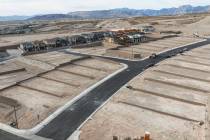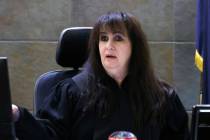Lawyers warn about new foreclosure law
By ED VOGEL
CARSON CITY — Southern Nevada lawyers warned the state Supreme Court on Friday that a soon-to-begin program to reduce foreclosures could fail because loan servicers won’t be able to modify loans for home buyers.
Attorney Kirk Williams expressed concern that loan servicers will not offer better terms to home buyers facing foreclosure because the actual owners of the loans in default are investors.
"The investors won’t appear," said Williams during a public hearing held in Las Vegas and simulcast in the high court’s chambers in Carson City.
But Assembly Speaker Barbara Buckley, the primary author of legislation that created the foreclosure reduction program, said mediators who conduct hearings between home buyers and lenders can recommend that the foreclosure be halted if the lender does not send someone with authority to modify a loan.
"It can’t be a servicer who does not have authority to enter into modifications," said Buckley, D-Las Vegas.
After a few foreclosures are halted, Buckley said lenders will come to the conclusion that they must participate in good faith and send people who can change loans to mediation hearings.
The law, however, does not require a lender to offer better loan arrangements.
Some are expected to give better deals because of the glut of foreclosures and the 34 percent drop in home values in Southern Nevada in the last year.
"They have to be there with authority to modify loans and have all (required) documents," Chief Justice Jim Hardesty said.
In particular, he said mediators must be given documents that show the loan owner’s guidelines for making loan modifications and what the home today would be sold for at a "short sale."
Short sales are when banks or loan companies sell foreclosed homes at less than the value of the mortgage.
Also, home buyers will be required to submit their financial records and state how much they could pay if the mortgage was revised.
At an earlier hearing, Justice Mark Gibbons said loan companies should start offering "short financing" to home buyers in default rather than so readily agreeing to short sales.
Buckley said she introduced Assembly Bill 149 because in her private job as executive director of the Legal Aid Center of Southern Nevada, many people came in who were losing their homes to foreclosure.
Over and over, she said, they told her they wanted to renegotiate their loans but where unable to do so because they could not find out who actually owned their mortgages.
They dealt with loan servicers, not the companies that owned their mortgages.
Often mortgages are sold repeatedly and homeowners might not know who holds their mortgages.
Buckley told the court that a loan servicer could secure a power of attorney from the loan owner that allows him or her to modify a mortgage.
The Supreme Court is scheduled to issue rules Monday on its Internet site, nevadajudiciary.us, that spell out how home buyers who receive default notices after July 1 can request mandatory mediation hearings in which attempts will be made to reach a new loan arrangement that keeps them from losing their homes.
Hardesty expects mediation hearings will begin in August. Under state law, the rules adopted Monday will not go into effect for one month. He said an administrator has been hired for the program, and that person’s identity will be announced soon.
At an earlier public hearing, Hardesty said he expects between 1,200 and 1,500 home buyers will request mediation hearings each month.
He said 427 lawyers, mediators and retired judges have been given authority to conduct the mediation hearings. Many are undergoing training.
Under the law, they cannot be paid more than $400 for conducting the hearings. Half of that money will come from the home buyer and half from the lender.
In response to questions, Hardesty said that since the law goes into effect Wednesday the rules as now written cannot help people who received default notices before July 1.
But he said that rules that apply to existing defaults might be adopted if the buyer and lender agree voluntarily to a mediation hearing.
Hardesty emphasized both buyer and lender are required to attend the mediation hearing and negotiate changes "in good faith," under the law.
"I know there is a lot of skepticism," he added.
Nevada ranks No. 1 in the U.S. in its foreclosure rate and the foreclosure problems contributed to the recession, according to Buckley.
"This has turned into a national crisis," she said.
Buckley said that in some cases lenders induced home buyers into taking "risky loans," often adjustable-rate mortgages that they could not really afford.
But she emphasized the mediation program is not going to help someone who lost a job and cannot afford to pay even a reduced mortgage.
Contact Capital Bureau Chief Ed Vogel at evogel@reviewjournal.com or 775-687-3901.


















